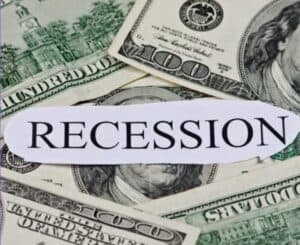Things are growing more serious as global concerns about a possible recession take root. It would be an understatement to suggest that people throughout the world are concerned about its possible impact.
It is unsettling to imagine how the economic slump will affect each generation, creating concerns about retirement savings, rising costs, financial stability, and business viability. According to the World Economic Forum,
“By 2025, automation and a new division of labour between humans and machines will disrupt 85 million jobs globally in medium and large businesses across 15 industries and 26 economies.”

Roles like data entry, accounting, and administrative support are diminishing as automation and digitization gain ground. Over 80% of business executives are expediting digital transformation, and 50% of employers anticipate automating certain positions. This marks a shift from previous years, with job destruction outpacing job creation.
In a time as uncertain as this, Entrepreneurs Today brings to you some business ideas that we believe are recession-proof.
Financial planning
Amid economic uncertainty, individuals across generations are concerned about the effectiveness of their financial plans or are hastily crafting them. With the looming possibility of a recession, the demand for financial planners is rising.
These professionals can assist clients in portfolio realignment, budget revisions, fund conversion, debt management, and more, providing vital support in turbulent times.
Debt collection agency
Sadly, an economic downturn implies that a lot of individuals will be unable to repay loans they took out for items they bought when the economy was doing better. Therefore, launching a debt collection firm will allow you the chance to be employed by businesses to reclaim assets that customers have neglected to pay or to collect unpaid debt balances.
It’s an essential service that will prosper in a downturn. The original debtor will typically have given up trying to get their entire loan back after it goes to a debt collection agency, but you will still be able to receive between 25% and 50% of any settlement that is obtained.
Consignment shops and thrift stores
With rising prices in clothing and furniture, consignment shops and thrift stores are gaining popularity. These budget-friendly options are becoming more appealing, especially for those with limited finances.
The consignment and thrifting industry, offering essential clothing and affordable household items, remains resilient and sustainable, catering to consumers seeking cost-effective solutions for their needs, whether outfitting themselves or enhancing their living spaces.
Freelancing
There are several platforms available that link clients in need of assistance with qualified independent contractors. You may be skilled in writing, web design, or almost anything that involves using a computer and an internet connection.
A sluggish economy is a fantastic time to start charging for these services, even though it might not give you enough money to cover your bills right away. There are lots of web-based firms who will pay for it.
Grocery and convenience stores
Starting businesses in grocery and convenience stores, food and beverage manufacturing, and food delivery services holds strong profit potential. The constant demand for food and drinks, whether for weekly groceries, quick meals, or food delivery, makes these sectors lucrative.
Moreover, the growing trend of remote work and busy schedules further fuels the popularity of food delivery services.
Repair Services
In an uncertain economy, people are increasingly opting to repair their devices instead of replacing them with new models. Starting a repair service for electronics or other mechanical items offers customers a cost-saving option during economic downturns.
This business model can extend beyond consumer electronics and encompass appliances, cars, and various mechanical devices, providing a versatile and recession-resistant entrepreneurial opportunity.
Refurbishment services
In a challenging economy, people are unlikely to part with their devices, but they will lean towards cost-effective options. Refurbished models can fulfill their needs without a hefty price tag.
Additionally, selling broken devices for cash becomes a more attractive option, both in challenging economic times and during recessions, reflecting shifting consumer behavior.
Healthcare industry
The healthcare industry offers stability and growth opportunities with increasing demand and medical advancements. Essential services such as pharmaceuticals, contraceptives, therapies, nursing, dentistry, radiology, and healthcare products like vitamins, supplements, at-home tests, and thermometers remain in consistent demand, ensuring a reliable market for entrepreneurs.
Property management
If you lack the capital for real estate investments, launching a property management company is a viable option. This service remains essential for renters and landlords alike.
Building a quality property management business can not only be profitable during challenging times but can also secure long-term clients, as landlords often seek to delegate tenant-related responsibilities for a fee when the recession ends.
E-learning industry
The e-learning industry is on a trajectory to surge from $197 billion in 2020 to a projected $840.11 billion by 2030. Teaching skills online is accessible to anyone with expertise and charisma, bypassing the need for formal qualifications.
Read more: The Evolving Landscape of Remote Work







